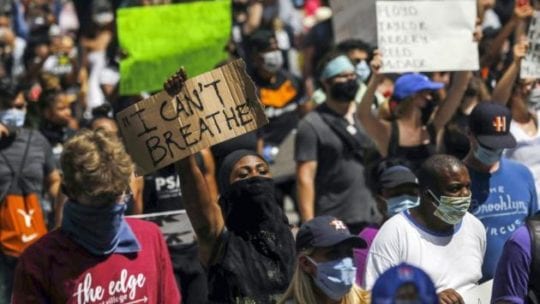
White text on black backgrounds. Black squares down timelines. Email from CEOs and Chief Diversity Officers.
No matter how the statements are delivered, countless brands are taking stands against racism and police brutality in the wake of the killings of George Floyd, Ahmaud Arbery, Breonna Taylor and many others.
Are these statements genuine or the result of public pressure?
Finding words to respond to social injustice isn’t easy, but there are steps organizations can take to navigate these issues with sensitivity.
Read the Room
It’s not enough to check the pulse of what's occurring. Take time to look around. What's the composition of your staff? Who are your customers? Have you considered the real and raw emotions they are dealing with, or are you making decisions because the conversation is trending?
Taking a people-first approach is nothing new for communicators. But with tensions high and breaking news hitting our phones constantly, it’s easy to become reactive, though it’s unacceptable. We have an obligation to ourselves and the organizations we represent to step back and assess the situation before making the next move.
Audit your actions before you edit your words
There’s nothing worse than a statement without action. Or better yet, a statement that contradicts years of inaction (cc: the NFL). Crisis communications 101, right? Here's a collection of cringeworthy phrases appearing this week: We stand with you…we see you…we hear you. Alone, these and other words hold little power. They fall flat once you hit send. However, when coupled with a plan, they not only carry weight, but contribute to concrete change.
Not to have mentioned @Kaepernick7 seems tone deaf. https://t.co/gTAAwwAr3t
— Seth@PRFollower (@skarenstein) May 31, 2020
The founders of Lyft, for example, recently called out injustice. What made Lyft's words powerful were two things: its history of addressing inequality (i.e., its program to expand voter access) and the fact that Lyft coupled words with action. Its commitment to communities of color through LyftUp is providing $500,000 in ride credits to national civil rights organizations.
Say the words
So, you’ve checked your room and checked your history. Perhaps now is the time to write. As communicators, oftentimes when crafting a message, aside from editing grammar, paying attention to word choice is vital to ensuring that what we mean to convey is what the reader perceives. Perception is—as we know—reality.
Ben and Jerry’s recent statement was a master class in communication that actually says something. As a longtime supporter of the Black Lives Matter movement, the brand called out recent tragedies, provided a list of next steps and used strong words: White supremacy, inhumane police brutality, victims of murder, racial violence and police accountability.
There was no skating around the issue or hiding behind safe words. It was expressive, bold and direct.
The murder of George Floyd was the result of inhumane police brutality that is perpetuated by a culture of white supremacy. https://t.co/YppGJKHkyN pic.twitter.com/YABzgQMf69
— Ben & Jerry's (@benandjerrys) June 2, 2020
The unrest we are seeing across the nation won’t disappear overnight, which is why it’s important for brands to continue speaking up and taking action.
As communicators help organizations find the words to genuinely address what’s taking place, toss the empty statements. Let’s be sensitive, honest and, more important, say something real.
Anything less minimizes these tragedies.
Wendy Roundtree is founder of Jarel Communications
